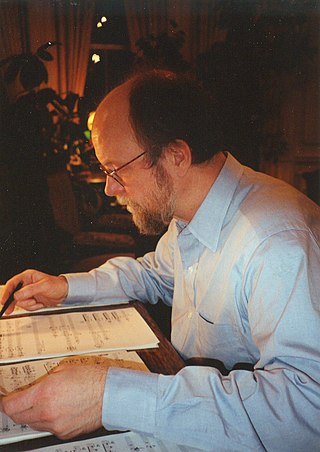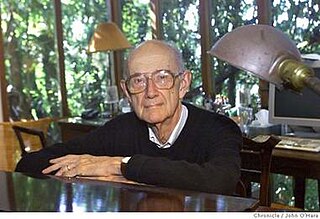Shulamit Ran is an Israeli-American composer. She moved from Israel to New York City at 14, as a scholarship student at the Mannes College of Music. Her Symphony (1990) won her the Pulitzer Prize for Music. She was the second woman to win the Pulitzer Prize for Music, the first being Ellen Taaffe Zwilich in 1983. Ran was a professor of music composition at the University of Chicago from 1973 to 2015. She has performed as a pianist in Israel, Europe and the U.S., and her compositional works have been performed worldwide by a wide array of orchestras and chamber groups.

Charles Peter Wuorinen was an American composer of contemporary classical music based in New York City. He also performed as a pianist and conductor. Wuorinen composed more than 270 works: orchestral music, chamber music, solo instrumental and vocal works, and operas, such as Brokeback Mountain. His work was termed serialist but he came to disparage that idea as meaningless. Time's Encomium, his only purely electronic piece, received the Pulitzer Prize. Wuorinen taught at several institutions, including Columbia University, Rutgers University and the Manhattan School of Music.
Mario Davidovsky was an Argentine-American composer. Born in Argentina, he emigrated in 1960 to the United States, where he lived for the remainder of his life. He is best known for his series of compositions called Synchronisms, which in live performance incorporate both acoustic instruments and electroacoustic sounds played from a tape.

Brian Cherney is a Canadian composer currently residing in Montreal, Quebec.

Andrew Welsh Imbrie was an American contemporary classical music composer and pianist.
Daniel Asia is an American composer. He was born in Seattle, Washington, in the United States of America.
Jindřich Feld was a Czech composer of classical music.
Margaret Brouwer is an American composer and composition teacher. She founded the Blue Streak Ensemble chamber music group.
Martin Boykan was an American composer known for his chamber music as well as music for larger ensembles.
Roberto Sierra is a Puerto Rican composer of contemporary classical music.
Ursula Mamlok was a German-born American composer and teacher.

Lior Navok is an Israeli classical composer, conductor and pianist. He was born in Tel Aviv. Navok studied composition privately with the Israeli composer Moshe Zorman, and completed a Bachelor's degree at the Jerusalem Academy of Music and Dance, where he studied composition and conducting. He later completed he studied for a Master's and Doctorate at the New England Conservatory, where he studied with John Harbison.
David Horne is a Scottish composer, pianist, and teacher.
Gary Alan Kulesha is a Canadian composer, pianist, conductor, and educator. Since 1995, he has been Composer Advisor to the Toronto Symphony Orchestra. He has been Composer-in-Residence with the Kitchener-Waterloo Symphony (1988–1992) and the Canadian Opera Company (1993–1995). He was awarded the National Arts Centre Orchestra Composer Award in 2002.
John Musto is an American composer and pianist. As a composer, he is active in opera, orchestral and chamber music, song, vocal ensemble, and solo piano works. As a pianist, he performs frequently as a soloist, alone and with orchestra, as a chamber musician, and with singers.
Alexander Mikhailovich Raskatov is a Russian composer.

David Serkin Ludwig is an American composer, teacher, and Dean of Music at The Juilliard School. His uncle was pianist Peter Serkin, his grandfather was the pianist Rudolf Serkin, and his great-grandfather was the violinist Adolf Busch. He holds positions and residencies with nearly two dozen orchestras and music festivals in the US and abroad. His choral work, The New Colossus, was performed at the 2013 presidential inauguration of Barack Obama.
Andy Akiho is an American musician and composer of contemporary classical music. A virtuoso percussionist based in New York City, his primary performance instrument is steel pans. He took interest in becoming a percussionist when his older sister introduced him to a drum set at the age of 9. Akiho first tried his hand at the steel pan when he became an undergraduate at the University of South Carolina. He began taking several trips to Trinidad after college to learn and play music. From there, he started writing pieces of his own.

Alex Burtzos is an American composer based in New York City and Orlando, Florida.
Jeremy Cavaterra is an American composer and pianist.





